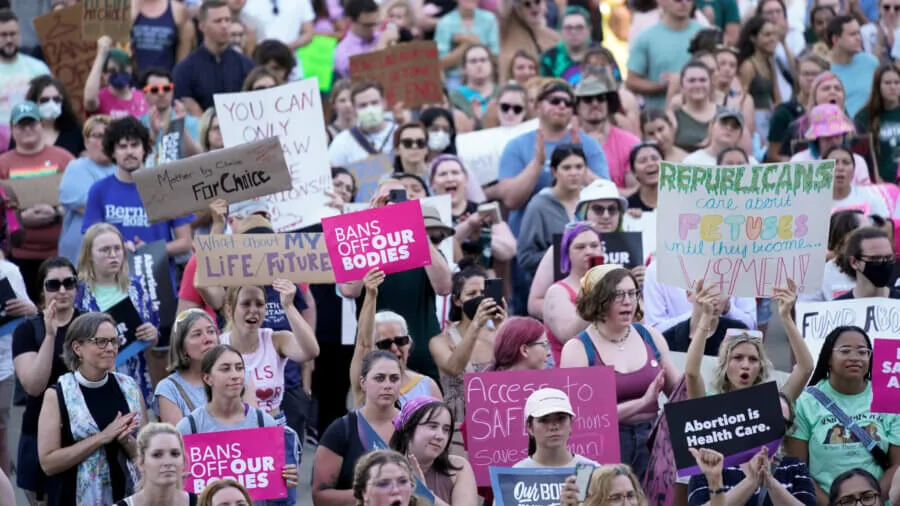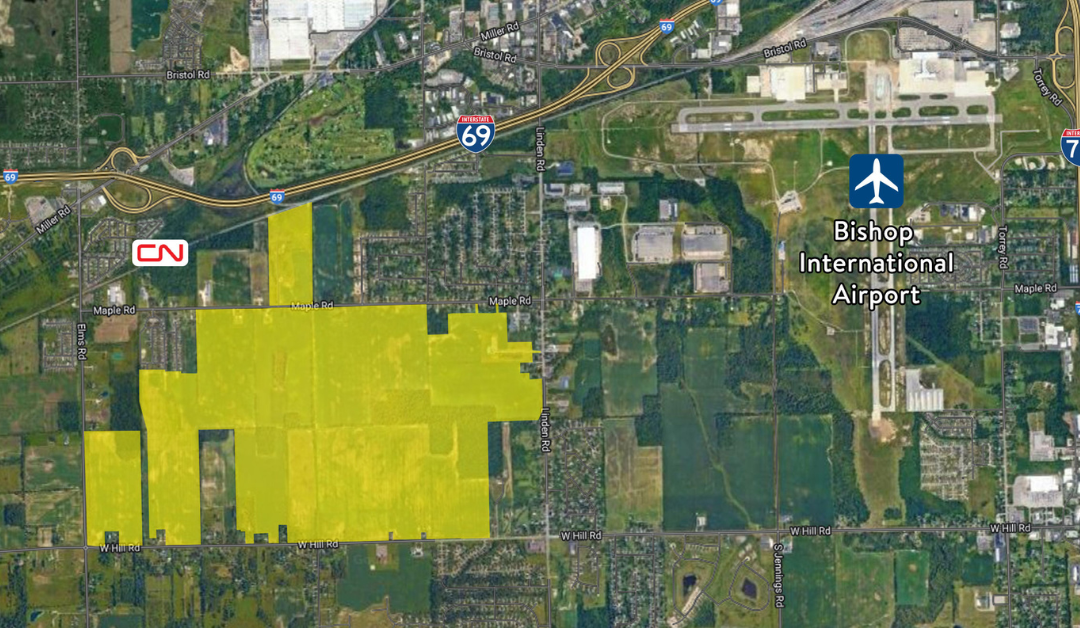
Abortion rights protesters attend a rally outside the state Capitol in Lansing, Mich., on June 24, 2022. (AP Photo/Paul Sancya, File)
On Thursday, the state Supreme Court ruled that a proposal to protect access to abortion care in the Michigan Constitution can appear on the November ballot for voters to consider.
LANSING—The Michigan Supreme Court ruled Thursday that reproductive freedoms should be decided by voters at the polls on Nov. 8. And that means all Michiganders who are registered to vote—not just politicians and judges—will get to weigh in on whether abortion care should be constitutionally protected in the state.
A 1931 state law that rolled back onto the books in Michigan after the overturn of Roe v. Wade earlier this year makes it a crime to perform most abortions statewide, but the law was suspended in May—and a judge this week followed up by striking the law down as unconstitutional. Though appeals of that decision are likely, the old law would be trumped if voters approve a proposed amendment to the state Constitution on the ballot to ensure every resident has the fundamental right to abortion.
And that means the future of reproductive freedom in Michigan—quite literally—is in voters’ hands.
What would the proposal do?
The Right to Reproductive Freedom initiative would settle the legal debate over abortion care by affirmatively asserting that pre-viability abortion care—meaning, when the fetus is not yet capable of surviving outside the womb—is a right guaranteed to all Michigan residents.
Though abortion care is the primary right asserted by the petition, it isn’t the only one.
The measure would also secure the right to obtain birth control, miscarriage management, prenatal care, and postpartum management—by cementing those as constitutional rights that could not be removed by state lawmakers without a vote of the public. It would also prevent prosecution of those who legally assisted a willing party in receiving abortion care; Michigan’s current 1931 law—which, again, has been ruled unconstitutional for now—allows doctors who provide those services to be prosecuted.
As a constitutional amendment, the petition could create a newfound right to reproductive health care.
Constitutional amendment seeking to: establish new individual right to reproductive freedom, including right to make and carry out all decisions about pregnancy, such as prenatal care, childbirth, postpartum care, contraception, sterilization, abortion, miscarriage management, and infertility; allow state to prohibit abortion after fetal viability unless needed to protect patient’s life or physical or mental health; forbid state discrimination in enforcement of this right; prohibit prosecution of an individual, or a person helping a pregnant individual, for exercising rights established by this amendment, a; and invalidate all state laws that conflict with this amendment.
— State-approved summary of Reproductive Freedom for All
How did we get here?
Supporters submitted more than 700,000 signatures, easily clearing the minimum threshold to push the measure to the ballot in November. Opponents argued the petitions had improper or no spacing between certain words and were confusing to voters—ultimately creating a Republican-led deadlock at the state Board of Canvassers, which temporarily tossed the measure from the ballot while appeals were filed. The latest decision from the state Supreme Court overturns that initial rejection, bringing the issue directly to voters.
Supporters have said it’s important for Michiganders to be able to weigh in on the reproductive freedom question—especially because of the possibility that opponents may attempt to bring the 1931 ban back into the fold. For now, abortion is legal in Michigan and prosecutors cannot enforce the old ban.
The order declaring the 1931 ban to be unconstitutional is likely to face a continued legal challenge—creating the possibility that Michigan could still become one of nearly two dozen states to ban or severely restrict access to abortion following the US Supreme Court decision to overturn Roe.
Who supports the petition?
Proponents include the American Civil Liberties Union of Michigan and Planned Parenthood. They say that the amendment is the most surefire way to protect reproductive health care in Michigan, as it reflects the public will and would be immune to pressure from the courts or politicians.
“If successful, the measure would amend Michigan’s constitution and permanently protect reproductive freedom. Getting involved with the ballot effort is the best action Michiganders can take to protect the right to safe, legal abortion in our state.”
Ashlea Phenicie
Planned Parenthood Advocates of Michigan
Michiganders support the right of a woman to have an abortion. A January poll found that 56% of Michigan residents identified as “pro-choice” while 34% identified as “pro-life.” Another poll found most Americans strongly opposed overturning Roe v. Wade.
Results of a poll published in September by The Detroit News and WDIV-TV showed abortion and women’s rights was the top issue motivating Michigan residents to vote in November, ahead of inflation and cost of living, education, and the economy and jobs. The poll also showed a majority of likely voters support a proposed constitutional amendment guaranteeing abortion rights.
Opponents of the amendment include Catholic organizations, the Republican party, and a group formed in opposition called “Citizens to Support MI Women and Children.” Some critics of the petition have dubbed Reproductive Freedom for All as the “anything goes abortion amendment,” according to the Detroit Free Press, but that claim doesn’t hold up against the actual language of the petition.
RELATED: Reproductive Rights Myths: Debunking What’s on the Ballot
Attorney General Dana Nessel, a Democrat who supports reproductive freedom, hailed the decision.
“Our state Constitution provides the people with direct access to the democratic process and that access should not be limited by appointed individuals acting beyond the scope of their duty,” she said.
In related news…
The state Supreme Court also ruled Thursday that voters in November will also decide whether Michiganders should have expanded opportunities to vote, including through absentee and early voting, through another proposed constitutional amendment that has been dubbed “Promote the Vote.”
After the measure was briefly blocked from the ballot by two Republicans on the Board of State Canvassers, the court sided on an appeal with supporters of Promote the Vote 2022, a coalition of organizations that submitted signatures to put the proposed constitutional amendment before voters.
If approved by voters at the General Election on Nov. 8, the measure would:
- require state-funded absentee ballot drop boxes
- require state-funded postage for absentee ballots and applications
- allow voters to join a permanent list to have absentee ballots sent for every election
- allow Michigan voters to verify their identity with a signed statement or a photo ID
- require nine days of in-person early voting—which would be new to Michigan
The Associated Press contributed to this report.
Politics

Michigan lawmakers look to break (another) state funding record for public schools
Democratic lawmakers are hashing out plans to bring state funding for Michigan’s public schools to another new, all-time high—and ensure teachers...

Mundy Twp. project gets state funding in effort to boost local manufacturing
More than $9 million awarded to a planned development project in Genesee County could provide a big boost to the local economy and help create...

It’s official: Your boss has to give you time off to recover from childbirth or get an abortion
Originally published by The 19th In what could be a groundbreaking shift in American workplaces, most employees across the country will now have...
Local News

More Michigan teens could soon take driver’s ed in their own schools
Privatization of driver’s education means that only 38 Michigan high schools offer affordable in-school driving classes for students. New grants...

That one time in Michigan: When we became the Wolverine State
How did Michigan become tied to an animal that's practically nonexistent there? Among the many nicknames that the state of Michigan has, arguably...





